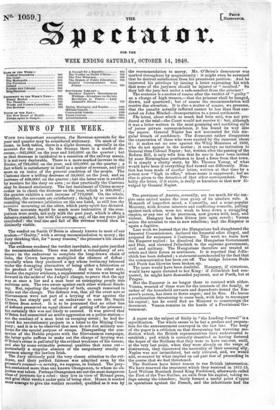The verdict on Smith O'Brien is already known to most
of our readers—" Guilty," with a strong recommendation to mercy ; the Jury thinking that, for "many reasons," the prisoner's life should be spared.
The evidence rendered the verdict inevitable, and quite justified the recommendation. There was indeed a redundancy of evi- dence: in the endeavour to complete the long-drawn chain of links, the Crown lawyers multiplied the chances of defeat ; especially when they produced a spy whose testimony laboured under the damaging alternative of being either a fabrication or the product of very base treachery. And on the other side, besides the regular evidence, a supplemental witness was brought forward in the midst of the Judge's charge, to prove that the spy was at once a liar and a man bent on entrapping people into seditious acts. The two swore against each other without flinch- ing. But, rejecting the testimony of both, enough remained to make out the charge. The defence was, that all the overt acts at Slievanamon were not part of a levying of war against the Crown, but simply part of an endeavour to save Mr. Smith O'Brien from arrest. It is to be presumed that no other line of defence presented an equal chance of getting off the prisoner ; but certainly this was not likely to succeed. It was proved that O'Brien had committed an active aggression on a police-station- not the conduct of a man bent on escaping arrest ; he had de- clared his revolutionary projects in a letter to the Mining Com- pany; and it is to be observed that men do not don military uni- forms for the special purpose of escape. Disregarding the con- nexion of the Dublin projects with the Slievanamon campaign, the latter quite suffices to make out the charge of levying war. O'Brien's crime is palliated by the evident weakness of his nature, and also by some estimable personal qualities that came out— particularly a singular absence of the sanguinary cruelty so common among the lawless Irish.
The Jury obviously paid the very closest attention to the evi- dence, and their perfect fairness was admitted even by the prisoner's counsel—a novelty, we suppose, in Ireland. The jury- ox contained more than one known Orangeman, to whom no ob- jection was taken. Perhaps Orangemen are not the most dangerous elan of jurymen for a rebel : they live in view of Riband guns, and give their verdict under pain of being shot. Hence it needed some courage to give the verdict recorded, qualified as it was by
the recommendation to mercy. Mr. O'Brien's demeanour was marked throughout by magnanimity: it might even be surmised that he derived satisfaction from his prominent position. And he improved his privilege by issuing a letter expressing his wish that none of the jurymen should be injured or "insulted." So they left the jury-box under a safe-conduct from the prisoner ! The sentence is a matter of course after the verdict of "guilty on a charge of high treason,—that the prisoner shall be hanged, drawn, and quartered ; but of course the recommendation will receive due attention. It is also a matter of course, we presume, that the penalty actually inflicted cannot be less than that exe- cuted on John Mitchel—transportation to a penal settlement. The letter, about which so much had been said, was not pro- duced at the trial—the Court would not receive it : but, although it was a letter written in the most gossiping and confiding style of jocose private correspondence, it has found its way into the papers. General Napier has not 'accounted for this sin- gular breach of confidence. The document rather disappoints the expectation of those who were excited by the rumours about it : it makes out no case against the Whig Ministers of 1832, Who do not appear in the matter ; it conveys no invitation to General then Colonel Napier ; but, written after the passing of the Reform Bill, it only tells him that he ryas to have been invited by some Birmingham gentlemen to head a force from that town. It is simply a chatty story, by Mr. Thomas Young, of what would have been if everything had turned out differently. Men- tion has been made of another letter, written at that time by a person now "high in office," whose name is suppressed ; but no clue is given to the detection of that other correspondent. Pro- bably the letter, if it exists, is really as harmless as that now di- vulged by General Napier.


























